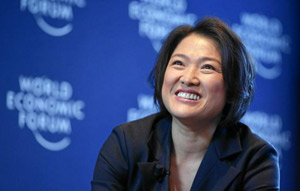Daughters take helm in family-run businesses
By Krishna Kumar Vr in New Delhi (China Daily) Updated: 2014-08-25 07:16"Having women leaders in family business in Asia is not a new concept, but was often hidden, as women often played the role behind the scenes," says Heidi Adick, director at Dew-Point International, a management consulting firm.
Nevertheless, China has made remarkable progress in the training and promotion of women to management positions. According to a survey by UK-based recruiting firm Hays, 36 percent of management roles in China are held by women, compared with the Asian average of 28 percent.
Xiaowei Rose Luo, associate professor of entrepreneurship and family enterprise at INSEAD, believes a woman can play a crucial role regardless of whether she has a formal title in the company.
"In a family business, a woman who is skilled at peacemaking is often the prime contributor to the prosperity of the family business," says Luo.
Adick of Dew-Point adds that a visible increase in women leaders of family businesses is in line with an increased number of women in the workforce.
Research from Grant Thornton International shows that Chinese women topped the world in terms of holding senior business management roles. It was found that 51 percent of senior management roles in companies on the Chinese mainland were held by women. Hong Kong ranked sixth with 30 percent, the Philippines 37 percent, Thailand 36 percent, Vietnam 33 percent, Taiwan 31 percent, Singapore 27 percent and India 19 percent.
In India, 31-year-old Roshni Nadar, the daughter of HCL Corporation founder Shiv Nadar, is set to succeed her father as chairman. Preetha Reddy, executive vice chairperson of Apollo Hospitals, one of Asia's largest healthcare groups, is also preparing to take the role of chairman when her father, company founder Prathap Reddy, retires.
The Middle East also boasts a number of high-profile women in very senior positions.
Fatima Al Jaber, second-generation family member of Al Jaber Group, runs one of the region's biggest construction firms. She oversees more than 40,000 staff and manages $4.9 billion in assets.
Amna Bin Hendi, CEO of Dubai-based conglomerate Bin Hendi Enterprises, is now overseeing that company's expansion into Abu Dhabi, Qatar and Kuwait.
Raja Easa Al Gurg, managing director of Easa Saleh Al Gurg Group, another conglomerate, is a well-known name in the list of female family business leaders in the region.
"In some business families they have only daughters and not sons. While in the past the automatic default would have been to sell the business, families are now to a greater extent handing the reins to their daughters," says Maya Prabhu, managing director of London-based Coutts Institute which specializes in family businesses.
She says that the notable increase in roles that women are playing in family businesses in Asia, both as owners and in leading management teams, can be attributed to several factors.
These include change in social and cultural norms, which is allowing space and recognition for more women to lead their family businesses, Prabhu says. With the younger generations, the trend for families is to treat women on par with men in education, training, career preparation and options within the business.
Many women are now very well educated, competent and equally as ambitious as men to make their mark in the business world.
According to a World Bank report, there were more women than men studying in universities in 60 countries it researched.
The report attributed the great strides in women's participation in the workforce to increased education.
Though the number of women leaders of family firms has been steadily increasing globally as well as in Asia, females still face significant obstacles in the boardroom.
"They frequently have to deal with perception issues more than business women leaders in the corporate world," says Mary Ann Tsao, chairman of the Singapore-based Tsao Foundation. "Sometimes, others assume that the latter got to their leadership position out of their competence, and the former are given their role solely because of their family relation."
 |
 |
| Top 10 richest families in China |
- Luxury brands need to be flexible
- Big growth potential still in China
- Truck drivers put Shell products to the test
- Chinese keen on investment immigration program
- Silk Road rally revs up with Beidou
- Change for the better in polluted Hebei
- Continental sets sights on replacement market
- China invests 30b yuan on Tibet water infrastructure
















